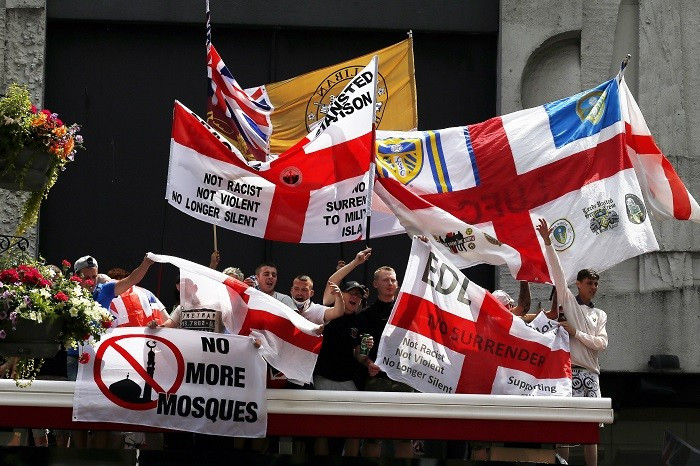State of Hate report: 'Pool of hostility' threatens to revive declining far-right extremism

Organised far-right groups in Britain are in steep decline but a deep "pool" of prejudice exists for spreading bigotry, a new report has found.
Diversity group Hope Not Hate (HNH) has published its study taking the temperature of fringe groups which comprise far-right extremism in the UK.
The movement is the weakest it has been for 20 years, concluded the State of Hate report.
Yet shocking incidents such as the terrorist attack upon Charlie Hebdo magazine in France could lay the ground for a comeback fuelled by Islamophobia and anti-Semitism in Britain, it is warned.
Hope Not Hate told IBTimes UK the potential exists for a far-right uprising, with social media websites comprising a "pool of hostility" just waiting to be tapped.
Particularly concerning to the group is a potential return to front-line activities by the former leader of the English Defence League (EDL) - an Islamophobic group.
It means significant potential exists for a far-right uprising like that achieved a few years ago by the EDL, under the leadership of Stephen Lennon - aka Tommy Robinson.
"Hope Not Hate understands Stephen Lennon is keeping his options open and considering a return to the fray and that's very worrying because he has the 'street charisma' which other leaders like Nick Griffin (BNP) and Paul Golding (Britain First) do not," said HNH spokesman Nick Ryan.
"The traditional far-right is in a state of decline. However that is not same as saying the pool of prejudice which could over spill does not exist, because it does.
"We were concerned by the rise in Islamophobia even before the Charlie Hebdo attack because if we saw – god forbid – an event similar to CH in the UK, then it's possible we could have tit-for-tat violence such as happened after the murder of Lee Rigby.
"There is a pool of hostility that, given the current climate of public debate, could mean we are looking at a far greater support for intolerance and prejudice than the parlous state of the far right suggests."
At the dawn of 2015, far-right groups in Britain are in a state of diminished size and influence, found the State of Hate report.
High-profile organisations such as EDL and British National Party are shadows of their former selves; lacking leadership and incapable of drawing supporters on to streets or in the ballot box in significant numbers.
Meanwhile, minor groups have found fertile ground online, with the likes of Britain First garnering half a million 'likes' on Facebook. However, it has utterly failed to translate this apparent endorsement into members who attend demonstrations, said the study.
© Copyright IBTimes 2025. All rights reserved.




















